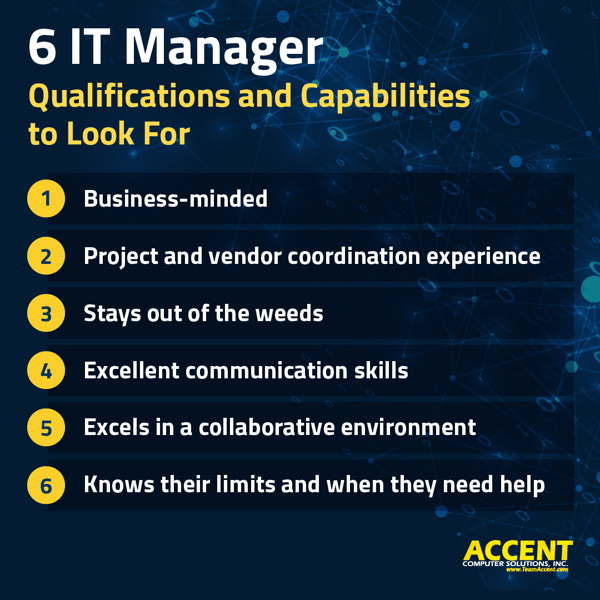You’re looking for an IT manager to manage and maintain your business network, and you’re wondering how to make sure they’re the right fit.
After all, you’re going to invest a lot into this person, so you want the most qualified, reliable, and capable person for the job. Or, as EOS would say, you need someone who “gets it, wants it, and has the capacity to do it.”
Whether this is a new role for your organization or you’re replacing an IT manager who’s moved on to another opportunity, taking the leap on a new hire can be nerve-wracking. And depending on your company’s size, industry, budget, and unique situation, it can be challenging to find the right person for the job.
We’re here to help.
As a managed IT services provider and IT consulting company, we’ve helped hundreds of small and mid-sized businesses get the results they need from their IT function. About 40% of those companies have an internal IT person or IT team, so we’ve seen firsthand how the right IT manager impacts the business.
In this article, we’ll cover:
- Why Is It So Hard To Find a Qualified IT Manager These Days?
- What Qualifications and Capabilities Does an IT Manager Need?
- How Do I Set My IT Manager Up for Success?
Why Is It So Hard To Find a Qualified IT Manager These Days?
Businesses searching for qualified IT managers are finding themselves with open job listings for months. Why? What changed?
The employment landscape drastically changed over the past two years due to the pandemic and the Great Resignation, giving job seekers the advantage when choosing their next employer.
People continue to reevaluate many aspects of their lives – their employer, work/life balance, compensation, etc. – and are making changes that better fit the lifestyle they want. Some even changed careers altogether or retired, leaving fewer qualified IT candidates available.
Expectations for wages and benefits have changed. According to a report published by Skillsoft, the average salary for IT professionals has consistently increased by 6% year-over-year. Businesses should expect to pay higher wages than they may have in the past and provide a good benefits package to attract qualified IT manager applicants.
The rise in remote work is also affecting job seekers’ decisions when choosing an employer. Working remotely has gone from being a rarity to the norm, and people have grown accustomed to it. As a result, the ability to work remotely (completely or flexibly) has become a determining factor when accepting a job offer.
What Qualifications and Capabilities Does an IT Manager Need?
It’s hard to define the qualifications and capabilities a person will need without understanding exactly what you expect them to do. The challenge with IT management is that every person’s idea of what “IT” entails is different.
Think of the term “IT manager” like a doctor. Doctor is the broad term, then you have specialists – cardiologists, neurologists, obstetricians, etc.
IT is made up of many different specialties, each with its own unique skill set – networking, systems administration, cyber security, application management, and information systems, to name a few. Often the term “IT manager” becomes a catchall for everything related to technology.
If you want someone to manage your ERP or CRM, the qualifications you’ll be looking for will be drastically different than someone you expect to provide help desk services to your employees.
6 Attributes You Won’t Find on an IT Manager Job Description Template
If you’re looking for someone to take ownership of your infrastructure and make sure the direction of IT will meet your business goals, here are a few things to look for that you won’t find on a standard IT manager job description template:

1. Business-minded
Today’s IT manager needs to be more business-minded than the super technical IT manager of the past. This mindset helps them develop a long-term IT strategy and business technology plan instead of simply focusing on technical issues and putting out fires. One way to tell if they’re business-minded is to ask them what kind of IT KPIs they would track related to IT. This will give you a good idea of what they think is important and help you determine if they align with your business technology vision.
2. Project and vendor coordination experience
There are a lot of moving parts in IT. Coordinating projects and vendors (Ex: internet service providers, application vendors, physical security vendors, device manufacturers, support vendors, and other technology partners) is a big part of today’s IT manager role. They’ll also be responsible for managing the contracts with several of these vendors and making sure everything stays current.
3. Stays out of the weeds
There will be times when the IT manager needs to dig into a complex issue, but if they spend their days working on end-user problems or managing system alerts, it’s going to be hard for them to see the big picture.
4. Excellent communication skills
When you’re working with a lot of vendors and employees, it’s important to thoroughly communicate so everyone is on the same page.
5. Excels in a collaborative environment
Since IT is made up of so many specialties, your IT manager should excel at working with specialists to handle the work that’s outside their skill set. Also, much of IT management is mundane (yet critically important) work. Collaborating with an outsourced vendor for things like patch management, backup management and administration, and routine system maintenance gives them time back to focus on their higher-level objectives.
6. Knows their limits and when they need help
No one can know everything. And anyone who says they can do it all on their own isn’t being honest. You want an IT manager who will ask for help when they get in over their head since their work is so critical to your operations.
VC3’s founder, Marty Kaufman, wrote a book called Do IT Right: It’s Not About the Computers that dives into this concept even deeper. It goes into personality traits you should look for, red flags to avoid, and more tips for successful IT management.
How Do I Set My IT Manager up for Success?
You’ve found the right person, and they’re ready to hit the ground running. Now what? How do you make sure they’re successful and get the results you expect?
Set Realistic Expectations and KPIs
IT management is a big job with a lot of moving parts. To be successful, IT and executives need to be on the same page with what’s expected from IT.
First, you’ll need to define what “IT” means to you. Traditionally, the focus of an IT manager is to lead your business in all IT-related activities. Their duties include coordinating and implementing new hardware and software, developing a business technology roadmap for your company, and managing in-house IT personnel, among other high-level tasks.
Companies get the best results when the IT manager is focused on using technology to support the company’s objectives, with IT best practices and security in mind. This enables the organization to hit its business goals without losing control over the IT department.
Once you’ve defined what “IT” is to you, set up KPIs and a meeting rhythm just like you would for any other department. You meet regularly with finance to make sure everything is in order – IT needs management and accountability too. This keeps everyone on the same page, working toward the same goal.
Outsource Routine or Specialized IT Tasks
Even when you do find the perfect person to fill your IT manager role, they won’t be able to handle every IT task on their own – no single person can. Asking them to do so would be setting them up to fail.
Working with an outsourced IT services provider can help fill those gaps, get the noise out of your IT environment, and elevate your IT manager so they can focus on strategy and other high-priority tasks.
Many companies outsource commoditized or routine tasks, like backup management, proactive system maintenance, new employee onboarding and offboarding, patch management, etc. These tasks are critical to a well-running IT infrastructure but are often put on the backburner by internal IT staff since they have limited time and resources.
Highly specialized work, like cyber security or CMMC compliance, is also often outsourced to experts in those fields since they are different disciplines and require different toolsets than IT management.
When managed IT services providers and IT managers work together (often referred to as co-managed IT services), you get a secure, reliable, and well-maintained business network. This increases productivity and enables you to reach your business goals without technology getting in the way.
🔎 Related: 3 Ways Managed IT Services Providers Help IT Departments Be More Effective
Get Clarity on IT Management in Your Business
Figuring out how to staff your IT department is an important business decision. If you’re still not sure how to choose the right IT manager, or if you aren’t getting qualified IT manager applicants, reach out to us any time. One of our technology consultants would be glad to help you evaluate your options to get the right mix of IT support for your business.


